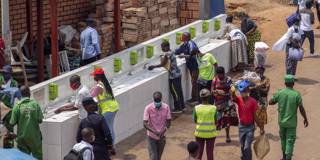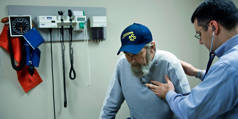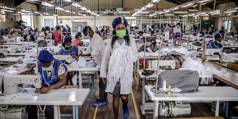Project Syndicate: Last December, you wrote that in managing the COVID-19 pandemic, Rwanda had set “a shining example.” The most important reason, you noted, is a “health-care system based on equity, access, and public trust,” which “follows a decentralized model that emphasizes prevention and care at the community level.” At the Back to Health event, you will participate in a panel focused on preventing the next pandemic. How can a health-care system like Rwanda’s help to stop an outbreak before it starts?
Agnes Binagwaho: Rwanda’s resilient health system was designed to serve all citizens equitably, with a particular focus on the most vulnerable. To break geographical barriers to access, the system is decentralized: 60,000 community health workers have been selected by their village-peers and trained by the Ministry of Health to carry out essential tasks. These include providing preventive care, treating uncomplicated cases of common illnesses (upper respiratory infections, gastroenteritis, and malaria), and referring patients for higher levels of care when necessary.
Crucially, community health workers also communicate to those they serve how, when, and why to take advantage of health services. By bridging the gap between the health system and communities, this decentralized approach improves health outcomes, contributes to social-capital enrichment, and facilitates the rapid detection of – and response to – new health threats.
The key to such a system is trust. Community health workers are entrusted by their village-peers to deliver health care. More broadly, the Rwandan government has demonstrated a commitment to protecting the most vulnerable members of society by pursuing equity-focused policies, strategies, and programs. During the COVID-19 pandemic, for example, those most in need received social support. This reinforces people’s trust in their country’s public-health system and increases adherence to outbreak guidelines and protocols – essential to prevent new health threats from turning into epidemics.
But this level of public trust cannot be established overnight, much less in the midst of a crisis. It demands many years of participatory, people-centered governance. Any strategy for preventing the next pandemic must make this a high priority.
PS: Of course, preventing a pandemic will depend not only on national-level interventions, but also on global cooperation. Which steps should policymakers be taking to bolster global health solidarity, particularly in terms of pandemic prevention?
AB: The coronavirus crisis has made clear that solidarity is the only way to end a pandemic. And numerous solidarity-based initiatives – such as the COVID-19 Vaccine Global Access (COVAX) facility – have been created or strengthened over the last year, albeit with varying degrees of success.
Policymakers should capitalize on this awareness to push forward a global solidarity agenda, backed by comprehensive strategies, long-term commitments, and supportive organizations and policies. Governments should also send a clear message to their citizens that, during a pandemic, nationalism kills and prolongs the global crisis for all. And they should take advantage of international meetings, such as G7 and G20 summits and the United Nations General Assembly, to advocate for the uptake of the recommendations made by the Independent Panel on Pandemic Preparedness and Response.
To succeed, policymakers must synchronize their arguments and secure multisectoral support for solidarity-based initiatives. They must make clear that solidarity is not synonymous with charity. Rather, it is a means of ensuring international health security by supporting health systems that bear a legacy of centuries of exploitation, as well as the brain drain that occurs when health professionals, educated at high cost in low- and middle-income countries, move to high-income countries to work.
To put this in perspective, as of 2011, nine Sub-Saharan countries were losing a total of $2.17 billion in returns on their investments in training doctors who had moved to Australia, Canada, the United Kingdom, and the United States to work. Meanwhile, the UK alone gained $2.7 billion in benefits from recruiting trained doctors from these nine countries.




